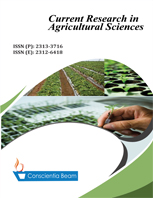An Assessment of the Market Structure of Sesame among Farmers, Wholesalers and Retailers in Nasarawa State, Nigeria
DOI:
https://doi.org/10.18488/journal.68.2017.42.32.42Abstract
The study assessed principally the level of equality/inequality in the sales distribution of sesame among farmers, wholesalers and retailers. The sampling procedure used involved a random selection of 120 sesame farmers, 40 wholesalers, and 60 retailers proportionately drawn from the three agricultural zones of Nasarawa State. The instrument for data collection was a structured questionnaire. Tools of data analysis were descriptive statistics, regression technique and measures of market concentration such as Lorenz curve, Gini coefficient and Herfindahl index. The results which showed Gini coefficient index values of 0.686, 0.331 and 0.589 and Herfindahl index values of 0.115, 0.442 and 0.118 for farmers, wholesalers, and retailers, respectively, were indications of varying levels of inequality in the distribution of sesame sales income and the existence of some monopolistic forces in sesame market. Socio-economic variables which affected sales income (the main determinant of market concentration) positively and significantly (p≤0.01) were education, total value of investment and non-farm sources of income. As farmers and middlemen are indispensably interdependent, deliberate policy intervention is required in areas such as adequate formal credit, diversification of enterprises and human capital development to make them (farmers and middlemen) more competitive in the rapidly evolving global economy.

